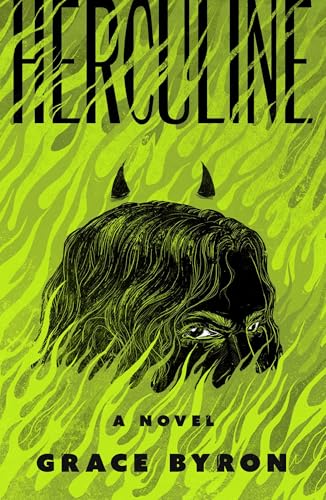“So much of transsexualism is the divulging of history,” Grace Byron writes in her propulsive and searing debut novel, Herculine. “It is not a gift so much as a bomb we’re all passing to each other.” In this case, it’s literal. An unnamed narrator passes time in New York City by doing bumps of ketamine, freelance writing, sexting, and trying to ignore the demon in her head, spurned by adolescent conversion therapy. At first it seems hammed up — “Evil, evil girl,” the demon tells her — but becomes frighteningly real as she makes her way to an all trans-girl commune her ex invited her to via the text “girl i’m literally begging you to join the cause,” which feels more appropriate for going out on a Friday night than uprooting your life and sleeping in cabins.
“For a lesbian commune,” she notes when she first arrives, “the girls read surprisingly little Sylvia Plath.” They have dyed hair and tattoos, though, and for food, they’ve started a GoFundMe. “Some girls cammed, some girls scammed Amazon, everyone chipped in farming,” Byron writes, at once a perfect satire of a utopian anarchist community New Yorkers are desperate to flee and form and a completely realistic order of operations that lesbians could achieve. She and Ash have intense, constant sex — the narrator feels guilty for leaving her prematurely to heal after bottom surgery — but it feels nice to be the host’s little plaything, a continuous plus one. She’s staying in Ash’s cabin (“a little concubine for the queen”) and other girls have started to notice and move away from her at their dinners.
It’s true though that wherever you go, you will follow — the demon inside the narrator’s head re-emerges here. The commune has revealed itself to be slightly different; the girls have all sold their souls to the devil, basically, in exchange for facial feminization surgeries and the ability to get pregnant. It’s an interesting, probing concept — these trans women have already manipulated and transformed their bodies to be more like the ideals they had in their heads, but exactly how far will they go? Is an eternal connection to the underworld worth the self-actualization that comes from being able to engage in the purest and most indisputable form of womanhood, pregnancy? And, what, is the baby gonna be evil or something? “Trans-girl utopia, baby,” Ash says, smiling. “At Herculine, we can get all that we want.”
Through its structure of communal living and trans solidarity, Herculine feeds on complex thought patterns like these — everyone justifies their involvement with the demon since they feed on trauma as much as trans girls do — a “survival tactic,” Ash says. “It’s a dissociation tactic, an art practice, a bonding element.” It’s a lot to consider. With the demons’ help, the narrator could publish a book, get FFS, anything she desires to prove to everyone back in New York that she’s worthy. This will show everyone who thinks “abolishing the cop in your head” is an interesting thing to write about. Hasn’t she been pestered by her internal demons — with no reward — for years?
Though at times the book doesn’t feel as sharp as Byron’s other, prolific criticism — the commune scenes were often hard to conjure, the girls blurring into themselves, and the finale’s all-out war against subtlety felt like a graphic, gory fireworks display — Herculine delves deep into our own desires, however messy (and often disgusting) they are. It’s a jarring, sticky novel that isn’t afraid to wade into the muck of transness and feminism, emerging with some urgent, and bizarre, solutions. A bomb indeed.
Herculine is out now.

